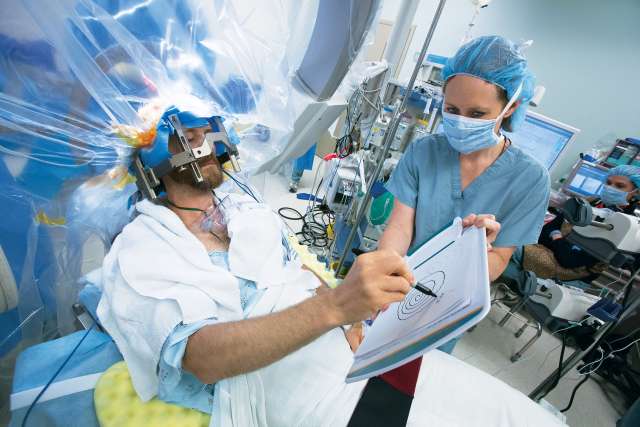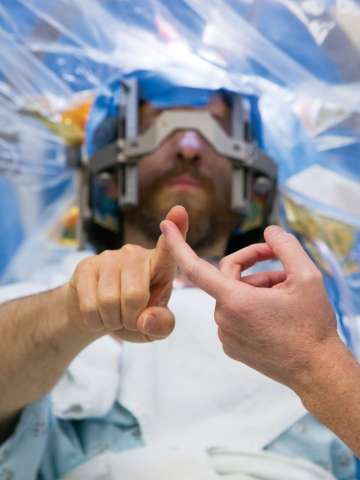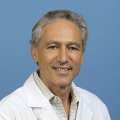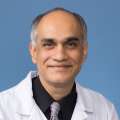Neuromodulation
Our specialists offer a variety of neuromodulation treatments, using many advanced techniques that aren’t available elsewhere in the country. Procedures include surgery to target specific nerves or implantable devices to treat pain.


Why choose UCLA Health for neuromodulation?
Neuromodulation is a neurosurgical specialty that treats movement disorders, psychiatric disorders and chronic pain. We may perform surgery to alter a specific nerve or implant spinal cord devices that block pain signals or stimulate the brain or nerves to restore function. At UCLA Health, the specialists in the Neuromodulation Program offer comprehensive treatment for movement disorders, chronic pain and psychiatric conditions.
Highlights of our program include:
Physician expertise: Our neurosurgeons are highly trained physicians who care for a high volume of patients each year. We are the most experienced, fellowship-trained neurosurgery team in Southern California and have performed the highest volume of deep brain stimulation (DBS) surgeries in the region. We have been performing these procedures longer than any other neurosurgery team in the country.
Advanced techniques: We are one of only three hospitals in California to offer a specialized noninvasive treatment for essential tremor. MR-guided focused ultrasound (MRgFUS) uses high-intensity, focused ultrasound energy waves to heat up a precise target in the brain, creating a permanent lesion and effectively treating tremors.
State-of-the-art equipment: We use the latest technology to perform a range of complex surgeries. An intraoperative CT scanner allows us to perform DBS without having to move patients out of the operating room for imaging. We also use the Novalis shaped beam system to perform incision-less procedures, the gold standard technology in stereotactic radiosurgery.
Personalized care: Our specialists strive to find the treatment plan that’s most effective for each patient, whether or not that includes surgery. We tailor each care plan to meet your individual needs.
Team-based, expert treatment: Our multispecialty team includes the expertise of world-renowned neurologists, psychiatrists, psychologists, anesthesiologists, pain management specialists and neurosurgeons. All our specialists are heavily involved in research and are published experts in neuromodulation techniques.
Our areas of care
Our neurosurgeons offer neuromodulation for a variety of conditions. Specialized programs include:
Deep Brain Stimulation Program for Psychiatric Disorders
We offer deep brain stimulation as a treatment option for patients with chronic, severe and treatment-resistant OCD. In this procedure, a neurosurgeon implants electrodes in the brain. These electrodes attach to a device that is implanted in the chest. The device sends electrical pulses to the brain.
We partner with colleagues in psychiatry to offer this advanced treatment. This program has been developed as a direct result of our research efforts to find new treatments and therapies.
Movement disorders and pain conditions we treat
We may use neuromodulation to treat a broad spectrum of conditions, including:
Chronic pain: An umbrella term for persistent, ongoing pain that isn’t the result of another problem or injury, such as a broken bone
Complex regional pain syndrome (CRPS): Chronic limb pain developing after an injury, heart attack, stroke or surgery
Dystonia: A movement disorder that causes involuntary muscle spasms and stiffness that interferes with walking and typical movements
Essential tremor: A neurologic disorder that causes involuntary rhythmic movements that worsen with activity
Headaches: Chronic head pain that may occur in cycles, be accompanied by other symptoms such as blurred vision or nausea, or be caused by nerve inflammation
Obsessive compulsive disorder (OCD): An anxiety disorder characterized by recurrent, intrusive thoughts or impulses along with repetitive, ritualized behaviors (compulsions)
Parkinson’s disease: A movement disorder that causes involuntary movements, rigidity, abnormal walking and posture
Peripheral nerve disorders and injuries: Conditions that involve damage to the peripheral nerves , the nerves outside the brain and spinal cord that carry messages between the brain and the rest of the body
Spasticity: A neuromuscular disorder that causes muscle stiffness, overactive reflexes and involuntary movements
Tourette’s syndrome: A neurological disorder that causes repetitive, involuntary movements and sounds (tics), often starting in very young children
Trigeminal neuralgia: A chronic pain condition characterized by sharp facial pain coming from the branches of the trigeminal nerve running along the cheek and jaw
Neuromodulation treatments we offer
We use state-of-the-art techniques to provide neuromodulation treatment, including:
Cingulotomy: This procedure targets and alters tissue in the portion of the brain associated with chronic pain (anterior cingulate region). Our neurosurgeons use MRI to pinpoint exactly which part of your brain to target. Then they guide an electrode to that area of the brain, where radiofrequency energy creates a lesion on each side of the brain. This procedure can reduce chronic pain symptoms by 60% to 70%.
Cordotomy: This procedure targets specific nerves in the spine that send pain signals. Surgeons use image guidance and a special needle with a radiofrequency electrode to create a lesion in a precise location in the spine. This disables the affected nerves and relieves pain. This treatment is effective for chronic pain conditions such as cancer-related pain.
Deep brain stimulation (DBS): A neurosurgeon implants electrodes within the brain that send small electrical impulses to targeted brain areas much like a pacemaker. Several days later, they place a generator in the chest. Wires connect the generator to the electrodes to control electrical impulses in the brain. DBS may treat Parkinson’s disease, dystonia, essential tremor, headaches, OCD or Tourette’s syndrome.
Dorsal root entry zone (DREZ) lesioning: In this procedure, the neurosurgeon performs a procedure called a laminoplasty, in which they make a temporary opening in the spine to access the spinal cord. Then, using a surgical microscope, they send radiofrequency energy to a small area of the spinal cord to eliminate the abnormal pain signals. It relieves pain in up to 70% of patients with brachial plexus injuries, a type of peripheral nerve injury often seen after motor vehicle accidents.
Intrathecal baclofen therapy: Baclofen is a medication that treats spasticity by relaxing certain muscles. An intrathecal baclofen pump is a device that sends high doses of baclofen directly to the intrathecal space of the spinal canal. These doses are 100 times more potent than oral baclofen and have fewer side effects. A neurosurgeon implants a disc-shaped pump and tubing (catheter) under the skin near the waistline. The tubing runs from the pump to the spinal canal. The pump must be refilled with medication by a health care provider every one to three months. The pump device gets replaced every seven years.
Microvascular decompression: This minimally invasive procedure treats trigeminal neuralgia caused by blood vessels that are putting pressure on the trigeminal nerve. The surgeon makes an incision behind the ear, creates a small opening in the skull to access the trigeminal nerve, then uses delicate surgical tools to move arteries away from the nerve. If there are any veins pushing against the nerve, the veins are cauterized (burned) to close them off. The surgeon places a small pad between the blood vessels and trigeminal nerve to prevent them from touching again. Up to 90% of patients experience complete pain relief.
Motor cortex stimulation: This procedure uses an implanted electrode and stimulator device to change how the nervous system works. The neurosurgeon uses MRI imaging to pinpoint which area of the brain to stimulate. Then, the surgeon uses the imaging as a roadmap to precisely place the electrode. The electrode connects to a generator placed under the skin in the chest that sends small pulses of energy to stimulate specific areas of the brain. Motor cortex stimulation is similar to DBS, but it places an electrode on the surface of the brain (primary motor cortex) rather than implanting it deep within the brain.
MR-guided focused ultrasound (MRgFUS): This technique uses high-intensity focused ultrasound waves to heat up precise targets in the brain as a treatment for essential tremor and tremor-dominant Parkinson’s disease. Patients wear a special helmet and lie in an MRI scanner. The provider uses MRI guidance to send ultrasound energy to the brain. Treatment involves several ultrasound doses, with patients performing certain tasks between doses to measure tremor improvement. Watch video.
Peripheral nerve and field stimulation: This procedure places one or more electrodes directly on nerves or under the skin at a targeted area where pain occurs. The surgeon places the electrodes through small incisions using X-ray guidance. The electrodes attach to a small generator placed under the skin that sends electrical pulses to the nerves. This treatment may be effective for nerve injuries, complex regional pain syndrome, occipital neuralgia or chronic headaches.
Radiofrequency ablation: The neurosurgeon uses precisely localized heat to target a specific nerve. Radiofrequency energy reduces the nerve’s ability to send pain signals to the brain. The procedure involves placing a needle through the skin and using X-ray guidance to position it on the affected nerve. It can reduce trigeminal neuralgia pain in 70% to 80% of patients.
Radiosurgical hypophysectomy: A neurosurgeon sends focused, high doses of radiation therapy to the pituitary gland. They use specialized MRIs to evaluate your brain anatomy and map out exactly where to send radiation. This procedure may be effective for cancer patients with severe pain who are nearing the end of cancer treatment options.
Spinal cord stimulation: The neurosurgeon implants a small device (spinal cord stimulator) that sends electrical impulses to the spinal cord to disrupt pain signals. First, they place one or more wire electrodes into the epidural space near the spinal cord. Then they implant a pulse generator underneath the skin around the waistline and connect it to the wire electrodes. Patients can control the generator with a remote so that it sends out electrical impulses to disrupt pain signals as needed. We may use this option to treat chronic back, leg or neck pain or complex regional pain syndrome.
Stereotactic radiosurgery: This noninvasive, incision-less outpatient procedure delivers a single, focused, high dose of radiation to a targeted area of the brain or specific nerve. Neurosurgeons perform a detailed MRI to map the brain. Patients wear a mask that drapes over the head and face to help ensure that we deliver radiation to the precise target area without affecting any surrounding tissues. This treatment may be effective for essential tremor or trigeminal neuralgia.
Meet our team
Our specialists are experts in neuromodulation techniques. We offer the full spectrum of treatments for a wide range of movement disorders and pain conditions. We are one of the highest-volume treatment centers in the region, with a rich history of expertise and leading-edge care.
Neurosurgery
Movement Disorders Neurology
Radiation Oncology
Contact us
Call 310-825-2631 to request an appointment with a neuromodulation specialist at UCLA Health.
Find your care
We offer neuromodulation for a wide range of movement disorders and pain conditions. Call 310-825-5111 to learn more about neuromodulation therapies.






